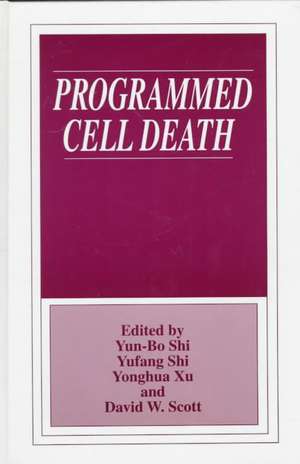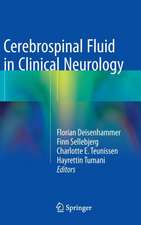Programmed Cell Death
Editat de Yun Bo Shi, Yufang Shi, Yonghua Xu, David W. Scotten Limba Engleză Hardback – 30 oct 1997
| Toate formatele și edițiile | Preț | Express |
|---|---|---|
| Paperback (1) | 939.00 lei 6-8 săpt. | |
| Springer Us – 4 iun 2013 | 939.00 lei 6-8 săpt. | |
| Hardback (1) | 944.36 lei 6-8 săpt. | |
| Springer Us – 30 oct 1997 | 944.36 lei 6-8 săpt. |
Preț: 944.36 lei
Preț vechi: 1151.66 lei
-18% Nou
Puncte Express: 1417
Preț estimativ în valută:
180.75€ • 187.99$ • 151.47£
180.75€ • 187.99$ • 151.47£
Carte tipărită la comandă
Livrare economică 13-27 martie
Preluare comenzi: 021 569.72.76
Specificații
ISBN-13: 9780306456800
ISBN-10: 030645680X
Pagini: 171
Ilustrații: VIII, 171 p.
Dimensiuni: 156 x 234 x 17 mm
Greutate: 0.41 kg
Ediția:1997
Editura: Springer Us
Colecția Springer
Locul publicării:New York, NY, United States
ISBN-10: 030645680X
Pagini: 171
Ilustrații: VIII, 171 p.
Dimensiuni: 156 x 234 x 17 mm
Greutate: 0.41 kg
Ediția:1997
Editura: Springer Us
Colecția Springer
Locul publicării:New York, NY, United States
Public țintă
ResearchDescriere
This volume contains papers that were presented and discussed at The 1996 Interna tional Symposium on Programmed Cell Death, which was held in the Shanghai Science Center of the Chinese Academy of Sciences on September 8-12, 1996. Apoptosis has attracted great attention in the past several years. This is reflected in part by the exponential increase in the number of papers published on the subject. While several major scientific conferences have been held in recent years, this meeting repre sents the first major international scientific meeting on programmed cell death held in Asia, where fast economic growth promises a bright future for both basic and applied re search in biomedical sciences. We organized the meeting with the belief that such a gath ering would foster a closer interaction between scientists from the West and those in Asia. Research on programmed cell death has expanded so extensively that no one meet ing can cover all the important subjects related to apoptosis. The Shanghai meeting fo cused on several key areas ranging from well-established ones, such as cell death in the immune system, to emerging ones, such as the role ofECM in regUlating cell fate. Specifi cally, the subjects presented and discussed included programmed cell death during devel opment, the regulation and biochemical mechanisms of lymphocyte apoptosis, the involvement of extracellular matrix and its remodeling in programmed cell death, genes that cause or prevent cell death, and the application of apoptosis toward cancer therapy.
Cuprins
How Hormones Regulate Programmed Cell Death During Amphibian Metamorphosis; J.R. Tata. Activation of Matrix Metalloproteinase Genes during Thyroid Hormne-Induced Apoptotic Tissue Remodeling; Y.-B. Shi, A. Ishizuya-Oka. Mechanisms by Which Matric Metalloproteinases May Influence Apoptosis; W.C. Powell, L.M. Matrisian. The Role of Integrin alphaVbeta3 in Cell Survival and Angiogenesis; S. Strömblad, et al. The Role of Granzyme B in Cyotoxic T Lymphocyte Assited Suicide; R.C. Bleackley. Caspase Inhibitors as Molecular Probes of Cell Death; A. Sarin, et al. Cell Volume Regulation, Ions, and Apoptosis; C.D. Bortner, et al. Regulation of p53-Dependent Apoptosis in Human Neuroblastoma Cells by Isoquinolines; V.C. Yu, F. Ronca. Inducible Fas-Resistance in B Lymphocytes; T.L. Rothstein, et al. Murdre and Suicide: A Tale of Ta nd B Cell Apoptosis; D.W. Scott, et al. Molecular Mechanisms of T Lymphocyte Apoptosis Mediated by CD3; D. Zheng, et al. Mitogenic Cytokines Promote Apoptosis: Possible Roles in Cellular Homeostasis; Y. Shi, et al. Molecular Mechanisms of Growth and Death Control of Hematopoietic Cells by Cytokines; J.J.Y. Yen, et al. Genetic Regulation of Apoptosis in the Mouse Thymus; B.A. Osborne, et al. 2 Additional Articles. Index.












